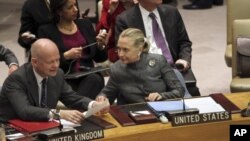U.S. Secretary of State Hillary Clinton says the United Nations must act to end what she calls the Syrian government's "divide and conquer" strategy against its own people. But Russia vows to veto any U.N. action against its allies in Damascus.
|
A Look at the Arab League
|
After meeting with her French and British colleagues in New York, U.S. Secretary of State Hillary Clinton went before the United Nations Security Council to support Arab League action against Syrian President Bashar al-Assad. "The United States urges the Security Council to back the Arab League’s demand that the Syrian government immediately stop all attacks against civilians and guarantee the freedom of peaceful demonstrations," she said.
Secretary Clinton says President Assad has driven his country to the brink of chaos and the longer he continues, the harder it will be to rebuild Syria once he is gone. "We all know that change is coming to Syria. Despite its ruthless tactics, the Assad regime’s reign of terror will end and the people of Syria will chart their own destiny. The question is how many more innocent civilians will die before this country is able to move forward to the kind of future it deserves," she said.
But Russian Foreign Minister Sergei Lavrov says U.N. action could make the situation even worse. "An essential element of any U.N. resolution must be the firm statement that this resolution can not be interpreted to justify any kind of outside military intervention in Syria," he said.
Steve Heydemann, a Middle East analyst for the United States Institute of Peace, says Moscow fears a change of government in Damascus would weaken Russia's position. "If the regime were to change and Syria were to move in a more pro-Western direction, I think the Russians would view that as a blow to their strategic posture in the region. And so one of the things that the U.S. might do is to offer reassurances to the Russians that even if a process of regime transition happens in Syria, they won't be left out," he said.
In order to avert a Russian veto, U.S. officials say they are ready to work with all U.N. members to pass a resolution supporting Arab League efforts to end the crisis. Secretary Clinton says failing to do so would abandon the Syrian people and embolden a dictator.
| Join the conversation on our social journalism site - Middle East Voices. Follow our Middle East reports on Twitter and discuss them on our Facebook page. |




